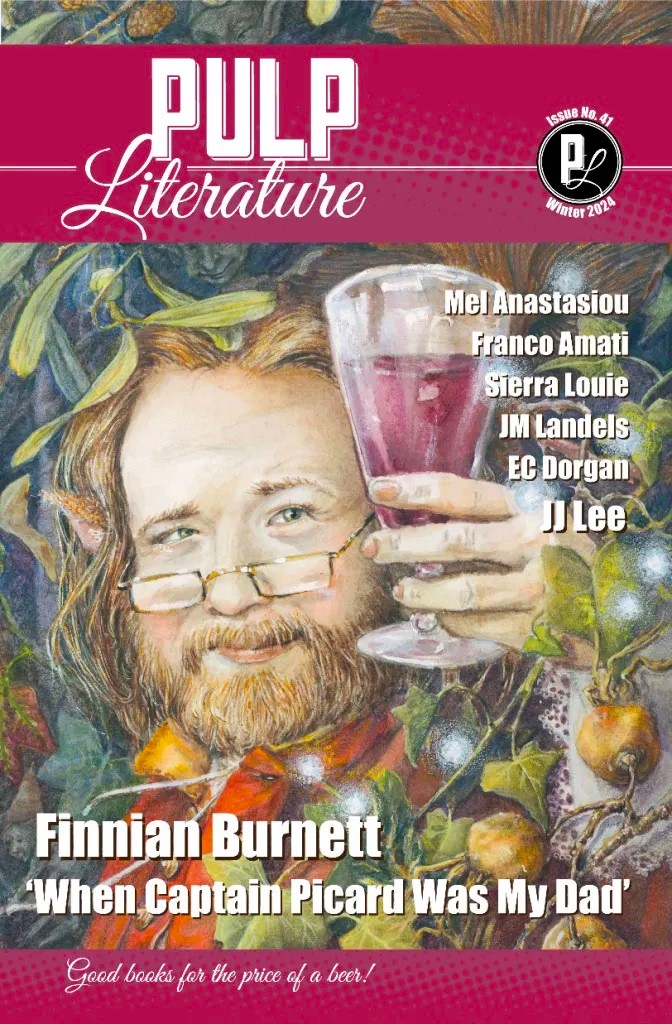
OBIR: Occasional Biased and Ignorant Reviews reflecting this reader’s opinion.

Pulp Literature Magazine #41 Winter 2024
Published by Pulp Literature Press, Langley, British Columbia, Canada, Winter 2024.
Editor in Chief: Jennifer Landels, Senior Editor: Melanie Anastasiou, Acquisitions Editor: Genevieve Wynand, Poetry Editors: Daniel Cowper & Emily Osborne, Assistant Editors: Brooklyn Hook, Sierra Louie & Ellen Spacey.
Cover art: Cheers – by Melissa Mary Duncan
Interior Illustrations – by Mel Anastasiou
When Captain Picard was my Dad – by Finnian Burnett
Premise:
Comparing fictional Captain Picard with actual Dad.
Review:
Incredibly short and incredibly impactful. Pretty much implying every dad should adopt Captain Picard as a role model. Against the argument that dads are “only human” to excuse their failings, this story offers the concept of Captain Picard being “only human” as a virtue.
Imprinting on Captain Kirk when I was a teenager, I’ve always appreciated his, let me say “dynamic enthusiasm,” over Picard’s more cerebral approach. In hindsight, I realise that Picard was/is infinitely more civilized and far more representative of an “improved humanity of the future” than Kirk, who represents a kind of evolutionary dead end.
I would also say the story reflects the “need” for science fiction as a genre. Fantasy is pretty much pure escapism, but science fiction, at its best, is escapism with a purpose, offering a better alternative in societal custom than contemporary reality. In that sense, the motto of science fiction is “Our life sucks, but it could be better.”
This story is an example of the kind of science fiction that enables readers to rise above the inhibiting level of past life experience “to infinity and beyond!” In other words, it offers hope.
Feature Interview – Pulp Literature interviews Finnian Burnett
Review:
Finnian advocates flash fiction as an ideal tool for a writer. You can pack a lot into very few words, whereas the need to fill a novel-length piece, it is implied, is often a case of “spot the padding.”
It is also implied that a useful hybrid would be a novella-length work composed of multiple inter-related flash fiction works. I’m rather struck by this, as it would suggest that the easiest way to break into long-work writing is to consciously produce short pieces that connect with each other. I’m not certain if this is a suggestion for a “new” writing form or an incomplete not-quite-there novel, but it seems like something that would work. It would perhaps be easier to read on a start/stop basis that would nevertheless add up to a coherent whole by the time the reader finishes.
Hmmm. Once I’ve abandoned my latest failed attempt at an unpublishable novel maybe I’ll try again with this new approach . . . might work!
The Golden Bull – by JM Landels
Premise:
The Golden Bull is a source of power a mother can use to protect her son, or is it?
Review:
This is a fantasy dealing with blood relations in a medieval-style kingdom where magic is mostly forbidden but actually quite common. Given that even in modern, western society there are people who cast spells for purposes both beneficial and evil (I know from personal experience), a story which examines behind-the-scenes politicking in light of secretive magic practices has relevance enough to render the premise credible as a fictional device. In other words, the magical underpinnings of this story are about as realistic as magic can get. Landels’ skill as a writer easily enables the reader to suspend disbelief.
That said, the story well reflects the fact that nothing in life, no matter what skullduggery is involved, is a sure thing. As always, you place your bet and takes your chances.
Objects and broken objects – (poem) by DS Maolalai
Premise:
Death is inevitable.
Review:
Ah, but death comes to more than just the living. There’s little to do but observe the consequences, if only for a still moment. Something rather Zen about death.
Moon Eater – by EC Dorgan
Premise:
Field research about the rougarou can be risky.
Review:
The story bounces back and forth between the viewpoint of Sarah, a Métis researching her cultural heritage, and Elzéar, a Métis salesman most of the time but a rougarou in the light of the full moon. They are destined to meet.
Most commonly known as a Cajun legend in Louisiana, the Francophone rougarou (werewolf), derived from the French loup-garou, is also found in Quebec and among the Métis in central Canada where it is said to prowl the roads and paths between Métis communities.
The most interesting juxtaposition in this story contrasts Sarah’s desire to know more about her heritage and Elzéar’s fervent desire to deny his nature. Their eventual meeting is refreshingly original and in keeping with the story’s perspective of supernatural beasties being perfectly natural. It manages to be both frightening and charming in equal measure. Remarkable.
To Make you Stay – (Poem) by Purbasha Roy
Premise:
Defining the absence of absence.
Review:
A prose poem with unusual imagery, so unusual as to occasionally seem disjointed and awkward, yet somehow revealing the combination of opposites which make up the balance in eternal longing for another. Hard to put into words, which is precisely the point. Nevertheless evocative and filled with imagery that lingers in the mind. It is an extraordinarily subtle and nuanced study of the emotional turmoil love creates in its victims. A lesson to ponder.
Nobody Knows It but Me. – by Franco Amati
Premise:
Technology helps a paralytic communicate his innermost desire for the first time.
Review:
One of the reasons people fear the onset of old age is the statistical likelihood of one’s last few years spent with a useless body whose warranty has run out, every aspect of life utterly dependent on the mercy of others, with the mind still alert and self aware but unable to communicate. The ultimate nightmare. This story explores that dilemma.
At first the story focuses on the emotions involved, some of them quite surprising, if only because I’ve always avoided thinking through what sort of mindset would likely result from an extreme level of incapacity. Then the story evolves into a quest for an explanation of a relationship dimly remembered. Ellis, the Paralytic, becomes able to communicate simple sentences via a newly developed brain wave analyser-gizmo, and the quest triggers a sense of purpose which, for the first time since the accident, gives him hope. Will his hopes be dashed or realized? He’s eager to find out.
The story not only works as fiction but is also a useful trigger to ponder how one would handle similar circumstances. The standard answer, of course, is to do the best one can. In my case, I think I’ve already came up with a game plan. I believe I would try to sleep as much as possible so that I could live in my dreams. I would then spend my waking hours recalling my dreams and elaborating them as if I were writing a script. Since every night would produce different dreams, daytime monotony would be avoided. Well, that’s my theory. Hopefully, I’ll never have to put it to the test.
My main point is that this story is an empathetic insight into a reality most people prefer not to think about. Call it enlightening, educational, and potentially very useful.
All the Rage: One Plus One is Three – (poem) by Aaron Poochigian
Premise:
Sometimes true love depends on violence.
Review:
No, not what you think. A puzzling poem, unless you make certain assumptions. Then it becomes clear. Not morally clear, but emotionally clear.
THE 2023 HUMMINGBIRD FLASH FICTION PRIZE WINNER
Field’s Nocturne No. 10 in E Major – by Matt Lombard
Premise:
A last ritual on behalf of Grandma.
Review:
A surreal expression of an old man’s love for his deceased wife, as witnessed by their grandson. Taut beauty in the description. Tragedy combined with completion, depending on how the reader interprets the ending. Quiet but powerful. In my opinion, masterfully original.
THE 2023 HUMMINGBIRD FLASH FICTION EDITOR’S CHOICE WINNER
Separate Worlds – by Chip Houser
Premise:
The planet Earth begins to behave differently.
Review:
If taken literally, bizarre, surreal science fiction. Since only humans experience the phenomena, a metaphor for our flaws and what we need to change. But to what end? Only we define our measure of strengths and weaknesses. Perhaps we are too close to the problem. But how can we be otherwise? Quite the conundrum. Is the Earth to be pitied, or us? And who, or what, exactly, cares? A call for contemplation.
Get Home Safe – (graphic art) by Sierra Louie
Premise:
A tiny, wingless fairy, out gathering berries, with a common slug for a mount, endeavours to reach home safely.
Review:
When you are only about an inch tall, the perils are many. There’s no hint of protective magic. Survival depends on caution and stealth. Perhaps a lesson that even the fae depend on the laws of nature to survive as much as any other prey creature? If so, an unusual and sober interpretation of supernatural beings normally associated with sprightly powers. Are they, like mice, born to be some other critter’s snack? But then, in a sense, aren’t we all?
Stella Ryman and the Labyrinthian Puzzle – by Mel Anastasiou
Premise:
Stella Ryman, the amateur sleuth of the Fairmount Retirement Home, is still in the outside world on the prowl for her friend Thelma Hu who had been taken away in an ambulance.
Review:
This is a placid but intriguing end to an ongoing series of cases solved by Stella Ryman. There are three sources of pleasure for the reader. The first is Stella’s entirely self-conscious method of investigating a mystery. Starts off in imitation of a particular fictional detective. If that doesn’t bring results, she adopts the methods of another, and if need be, adopts the intrusive and comprehensive methods of even more aggressive fictional models until she gets the results she is looking for. This is a lot of fun.
Second, the description of a hospital in action well reflects the labyrinthian puzzle every large hospital offers first time visitors of all types, casual or desperate. If you have ever spent time attending someone in hospital or being a patient trying to get about on your own, this will undoubtedly stir vivid memories.
Third, Stella’s powers of observation extend to all the people she deals with, which in turn offers her musings on diverse human approaches to death, suffering, old age, tender loving care, enduring the unendurable and all the other emotions and rationalizations associated with both the elderly and with hospitals. Sort of a “What it’s like to be old 101 course” for them as wishes to contemplate the twilight of life. Stella says, “Soldier on.” She’s a good role model.
Essentially, in solving this or that mystery Stella explores the mystery of life. Yes, a useful role model indeed.
The Haunted Ghost – by JJ Lee
Premise:
The Burrard Book store always closes early on Christmas Eve, because that’s when the ghosts come out.
Review:
The author writes and records a Christmas ghost story for CBC radio every year. This is one of them.
In this poignant story a ghost’s annual appearance is triggered by his love of reading. And the appearance of a host ghost was brought about by the mortal fate of the first ghost. Actions have consequences, especially after death, or so the story implies.
If I were a ghost, I would choose to haunt a large bookstore stocked with multiple genres of fiction and non-fiction. Spending eternity reading would be much more fun than haunting castle corridors. Thus, I can readily identify and empathise with this pair.
The story is not morbid. It is rather charming. Very much a Christmas story. I like it.
CONCLUSION:
Pulp Literature is always a good read. This issue sparkles with insightful originality and astute observation.
Check it out at: < Pulp Literature #41 >










